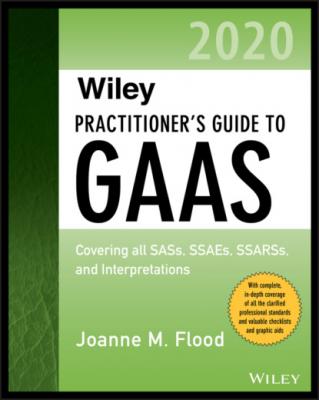Wiley Practitioner's Guide to GAAS 2020. Joanne M. Flood
Читать онлайн.| Название | Wiley Practitioner's Guide to GAAS 2020 |
|---|---|
| Автор произведения | Joanne M. Flood |
| Жанр | Бухучет, налогообложение, аудит |
| Серия | |
| Издательство | Бухучет, налогообложение, аудит |
| Год выпуска | 0 |
| isbn | 9781119596035 |
Audit Procedures for Obtaining Audit Evidence
The auditor should obtain audit evidence to draw reasonable conclusions on which to base the audit opinion by performing audit procedures to:
Obtain an understanding of the entity and its environment, including its internal control, to assess the risks of material misstatement. These procedures are referred to as risk assessment procedures.
When necessary, or when the auditor has determined to do so, test the operating effectiveness of controls.
Detect material misstatements by performing substantive procedures, which are substantive analytical procedures, tests of details, or a combination of both.
The auditor should use one or more types of the following audit procedures:
Inspection of records or documents such as checks, invoices, contracts, and minutes of meetings.
Inspection of tangible assets, such as inventory.
Observation of a process or procedure being performed by entity personnel.
Inquiry of knowledgeable persons inside or outside the entity.
Obtaining confirmation and other written representation from knowledgeable people within and outside the entity.
Recalculation by checking the mathematical accuracy of documents or records.
Reperformance of the entity’s procedures or controls.
Analytical procedures, as described in Section 520.
Scanning accounting data for unusual individual items
(AU-C 500.A14–.A23)
INTERPRETATIONS
The Effect of an Inability to Obtain Evidential Matter Relating to Income Tax Accruals
Occasionally, the client may not (a) prepare or maintain appropriate documentation of the calculation or contents of the income tax accrual, or (b) permit the auditor access to the documentation or necessary information, or to entity personnel with information about the income tax accrual.
In these circumstances, the client has imposed a scope limitation on the audit, and the auditor should determine the effect of the limitation on his or her ability to express an opinion on the financial statements. (AU-C 9500.04–.05) The auditor may express an unqualified opinion or a qualified opinion, or may disclaim an opinion.
The auditor should document all relevant information that he or she obtains about the income tax accrual. The documentation should include results of auditing procedures and should include significant elements of the client’s analysis of the tax contingencies or reserves. The documentation should be sufficient for an experienced auditor to understand the extent and results of auditing procedures performed. It should include the client’s analysis of tax contingencies and reserves, support for related disclosures, and support for assessing deferred tax assets. (AU-C 9500.12 and .13)
The opinion of the client’s legal counsel about the appropriateness of the income tax accrual is not sufficient competent evidential matter for the accrual. (AU-C 9500.16)
If a client is basing its position on a material tax accrual on an outside advisor’s opinion, the auditor should obtain the opinion, or the client’s summarization of that opinion. (AU-C 9500.19)
Similarly, an auditor cannot rely solely on the conclusions of a third-party tax advisor without careful consideration by the auditor. The auditor should have access to the tax advisor’s opinions and supporting evidence. (AU-C 9500.20)
If the auditor cannot obtain sufficient competent evidence, the auditor has a scope limitation. (AU-C 9500.22)
Auditor of Participating Employer in a Governmental Cost-Sharing Multiple-Employer Pension Plan
In June 2012, the Governmental Accounting Standards Board (GASB) issued statements No. 67 and No. 68 that change the reporting of public employee pension plans and the state and local governments that participate in those plans. In response, the Auditing Standards Board (ASB) issued three interpretations to assist plan and employer auditors in implementing those standards. Auditors of entities that have implemented the standards should reference AU-C Sections 9500, 9600, and 9805 for more information.
Auditor of Participating Employer in a Governmental Agent Multiple-Employer Pension Plan
In April 2014, the ASB issued this interpretation related to GASB No. 68. The Interpretation provides guidance on unaudited information provided by the plan’s management, the use of the plan auditor’s report as evidence by the employer auditor, and the evaluation of that information by the employer auditor.
Конец ознакомительного фрагмента.
Текст предоставлен ООО «ЛитРес».
Прочитайте эту книгу целиком, купив полную легальную версию на ЛитРес.
Безопасно оплатить книгу можно банковской картой Visa, MasterCard, Maestro, со счета мобильного телефона, с платежного терминала, в салоне МТС или Связной, через PayPal, WebMoney, Яндекс.Деньги, QIWI Кошелек, бонусными картами или другим удобным Вам способом.
